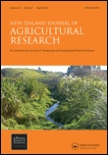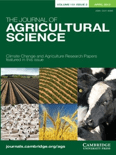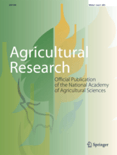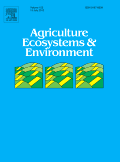
Scientific Papers-Series A-Agronomy
Scope & Guideline
Fostering Sustainable Practices for Global Food Security
Introduction
Aims and Scopes
- Soil Science and Management:
Research on soil properties, fertility, and management practices to enhance agricultural productivity and sustainability. - Crop Production and Agronomy:
Studies related to crop yield, quality, and the impact of various agronomic practices on different crops and their interactions with environmental factors. - Pest and Disease Management:
Investigation into pest and disease dynamics, including integrated pest management strategies and the effects of biocontrol agents. - Environmental Impact and Sustainability:
Research examining the ecological implications of agricultural practices, including soil conservation, carbon sequestration, and the use of organic amendments. - Innovative Agricultural Technologies:
Development and assessment of new agricultural technologies, including precision agriculture, remote sensing, and biotechnological advancements. - Agroecology and Biodiversity:
Exploration of agroecological practices that promote biodiversity and sustainable agricultural systems. - Climate Change Adaptation:
Studies focused on the impacts of climate change on agriculture and strategies for mitigating its effects through adaptive practices.
Trending and Emerging
- Sustainable Agriculture Practices:
There is an increasing emphasis on research related to sustainable agricultural practices, including organic farming, agroecology, and regenerative agriculture. - Soil Health and Microbiome Studies:
Research focusing on soil health, including microbiome dynamics and their impact on crop productivity, is gaining traction. - Climate Resilience and Adaptation:
Emerging studies are focusing on how agricultural systems can adapt to climate change, examining both mitigation strategies and resilience-building practices. - Use of Biopesticides and Biostimulants:
There is a growing trend towards exploring the effectiveness of biopesticides and biostimulants as sustainable alternatives to chemical inputs. - Precision Agriculture Technologies:
The adoption of precision agriculture technologies, including remote sensing and data analytics, is increasingly prevalent in the journal's recent publications. - Integrated Crop-Livestock Systems:
Research that integrates crop and livestock systems is on the rise, promoting synergies that enhance productivity and sustainability.
Declining or Waning
- Traditional Fertilization Practices:
Research on conventional fertilization methods is decreasing as interest shifts towards organic and sustainable fertilization alternatives. - Monoculture Systems:
The focus on monoculture cropping systems is waning as more studies highlight the benefits of crop rotation and polyculture for soil health and pest management. - Chemical Pest Control:
There is a decline in research emphasizing chemical pest control methods, reflecting a broader trend towards integrated pest management and organic solutions. - Traditional Tillage Practices:
Research on conventional tillage is diminishing as conservation tillage practices gain prominence for their environmental benefits. - Single Crop Focus Studies:
The trend of studies exclusively focused on single crops is declining, giving way to research that examines intercropping and multi-crop systems.
Similar Journals

NEW ZEALAND JOURNAL OF AGRICULTURAL RESEARCH
Innovating Solutions for Modern Agricultural ChallengesNEW ZEALAND JOURNAL OF AGRICULTURAL RESEARCH is a prestigious, peer-reviewed journal published by Taylor & Francis Ltd that has been at the forefront of agricultural science since its inception in 1958. With a strong focus on the fields of Agronomy and Crop Science, Animal Science and Zoology, Plant Science, and Soil Science, this journal has established itself in the academic community, achieving a notable Q2 ranking in various agricultural categories as of 2023. The journal thrives on its commitment to disseminating cutting-edge research and innovative practices that address contemporary challenges in agriculture. Although it does not currently offer an open access option, its valuable contributions can be accessed through various academic platforms, ensuring that vital research reaches a wide audience of researchers, professionals, and students globally. The journal's continued relevance and authority are reflected in its strong Scopus rankings, further emphasizing its role as a critical journal within the agricultural sciences.

JOURNAL OF AGRICULTURAL SCIENCE
Transforming Agriculture with Cutting-Edge ResearchJOURNAL OF AGRICULTURAL SCIENCE, published by Cambridge University Press, stands as a pivotal resource in the field of agricultural research. With a rich history dating back to 1905, this esteemed journal has consistently delivered cutting-edge scholarly articles that address pressing issues in agronomy, crop science, animal science, and genetics. Currently holding a Q2 ranking in Agronomy and Crop Science and Animal Science and Zoology, and a Q3 in Genetics, it reflects a robust impact within the academic community, contributing to innovative practices and technologies in agriculture. Indexed in Scopus, its authors benefit from broad visibility, supported by a strong readership among researchers, professionals, and students alike. While the journal does not currently offer open access, its rigorous peer-review process ensures that published works meet the highest scholarly standards, fostering a rich environment for knowledge exchange and advancement in agricultural science.

Agricultural Science and Practice
Elevating agricultural science through peer-reviewed excellence.Agricultural Science and Practice is a pivotal journal dedicated to advancing knowledge and research in the field of agricultural sciences. Published by the NATIONAL ACADEMY OF AGRARIAN SCIENCES OF UKRAINE, this journal serves as a vital resource for researchers, professionals, and students engaged in agriculture, agronomy, and related disciplines. The journal aims to disseminate high-quality, peer-reviewed articles that address contemporary issues, innovative practices, and advancements in agricultural methodologies. While currently specified as non-open access, the journal endeavors to contribute significantly to the global agricultural knowledge pool while fostering a collaborative research environment. With its base in Kyiv, Ukraine, Agricultural Science and Practice plays an essential role in highlighting regional agricultural challenges and solutions, thereby attracting a diverse readership that aspires to enhance food security and sustainable farming practices worldwide.

AGRICULTURAL RESEARCH
Empowering researchers to tackle contemporary agricultural challenges.AGRICULTURAL RESEARCH is a distinguished academic journal published by SPRINGER INDIA, focusing on the dynamic fields of Agronomy, Crop Science, and Food Science. With an ISSN of 2249-720X and E-ISSN of 2249-7218, this journal has established itself as a valuable resource for researchers, professionals, and students dedicated to advancing agricultural knowledge and practices. The journal is recognized in the 2023 Scopus Rankings, achieving commendable quartile positions, including Q2 in Agronomy and Crop Science and Plant Science, as well as Q3 in Food Science, indicating its influential presence in the academic community. AGRICULTURAL RESEARCH aims to disseminate cutting-edge research findings, innovative methodologies, and comprehensive reviews, fostering collaboration and discussion among scholars in Switzerland and beyond. Through its commitment to scholarly excellence, this journal is pivotal in addressing contemporary challenges in agriculture, ensuring sustainability, and enhancing food security for the future.

Agrivita
Exploring innovative solutions in agronomy and crop science.Agrivita is a distinguished, open-access journal dedicated to advancing research and knowledge in the fields of Agronomy and Crop Science. Published by Brawijaya University, Faculty of Agriculture, this journal has been providing a platform for high-quality scholarly articles since 2010. Located in the vibrant country of Indonesia, Agrivita plays a vital role in the exchange of innovative agricultural research, particularly within the Southeast Asian context. As of 2023, it holds a respectable Q3 ranking in its category, showcasing its commitment to scholarly excellence and visibility. With an increasing impact on the academic community, and its current Scopus rank placing it in the 48th percentile, Agrivita stands as a crucial resource for researchers, professionals, and students eager to deepen their understanding of crop science and agronomy. The journal's scope encompasses cutting-edge research that addresses both fundamental and applied aspects of agriculture, ensuring it remains relevant to today's pressing agricultural challenges. Its open access model enhances global accessibility, fostering a collaborative environment where diverse opinions and findings can converge.

AGRICULTURE ECOSYSTEMS & ENVIRONMENT
Pioneering Insights in Ecosystem Management and AgronomyAGRICULTURE ECOSYSTEMS & ENVIRONMENT is a premier journal published by Elsevier, specializing in the fields of agronomy, animal science, and ecology. With an impressive impact factor reflective of its stature, it ranks in the top quartile (Q1) across three significant categories, highlighting its critical role in advancing research within the agricultural and environmental sciences. The journal serves as a vital platform for disseminating high-quality research that addresses the complex interactions between agriculture and ecosystems, providing insightful methodologies and findings that inform sustainable practices. As the journal continues to converge from 1983 and through to 2025, it remains committed to offering both traditional and innovative access options while contributing to the academic community's understanding of pressing environmental challenges. Researchers, professionals, and students are encouraged to engage with the journal's comprehensive content, which is positioned among the elite in its fields, having achieved top rankings in Scopus across relevant disciplines.

Zemdirbyste-Agriculture
Fostering global discourse on food security and environmental health.Zemdirbyste-Agriculture is a prominent journal dedicated to advancing the field of agricultural sciences, with a particular focus on agronomy and crop science. Published by the Lithuanian Research Centre Agriculture & Forestry, this open access journal has been fostering knowledge sharing and scientific discourse since 2004, allowing researchers, professionals, and students unrestricted access to its content. Located in the beautiful country of Lithuania, specifically at Vytautas Magnus University, this journal plays a significant role in disseminating innovative research findings. With a 2023 Scopus ranking of #246 out of 406 in the category of Agricultural and Biological Sciences, Zemdirbyste-Agriculture falls within the Q3 quartile, reflecting its growing influence in the academic community. This journal, which has converged its publication focus from 2008 to 2023, aims to provide a platform for scientists to share their critical insights on agricultural practices, sustainability, and technological advancements in crop science, thereby contributing to the global discourse on food security and environmental health.

AGROCHIMICA
Cultivating insights for a resilient agricultural landscape.AGROCHIMICA is an eminent journal published by PISA UNIV PRESS, dedicated to advancing the fields of Agronomy, Crop Science, Food Science, and Soil Science. With a rich history dating back to its inception in 1973, this journal has evolved through various phases of publication, illustrating its commitment to delivering quality research over several decades. Although currently categorized in the Q4 quartile across its respective disciplines, AGROCHIMICA provides a platform for foundational and innovative studies that contribute to knowledge in agricultural practices and sustainable food systems. While the journal is not open access, it remains a valuable resource for researchers, professionals, and students interested in Italy's and the global agricultural landscape, fostering a greater understanding of the complexities within these interconnected fields. The ISSN associated with this journal is 0002-1857, and it is published from Pisa, Italy, addressing the evolving challenges in agriculture with a spotlight on rigorous scientific inquiry.

Egyptian Journal of Agronomy
Connecting Science and Sustainability in AgricultureEgyptian Journal of Agronomy, published by the NATL INFORMATION DOCUMENTATION CENT, ACAD SCIENTIFIC RESEARCH & TECHNOLOGY, serves as a pivotal platform for researchers, professionals, and students focusing on various disciplines within the agricultural sciences, including agronomy, soil science, horticulture, and ecology. With an ISSN of 0379-3575 and E-ISSN of 2357-0288, the journal aims to bridge the gap in knowledge and innovation in the field with its comprehensive studies and frameworks. While the journal is currently categorized in low Scopus ranks, indicating immense potential for growth in influence and impact, it remains dedicated to providing quality research and fostering advancements in agronomic practices. Set in Egypt, a hub for agricultural research, the journal is committed to reflecting the regional and global challenges in agriculture. The Egyptian Journal of Agronomy is a vital resource for anyone engaged in the evolving landscape of agricultural science, offering insights that promote sustainable practices and address current issues facing the sector.

Agricultural & Environmental Letters
Championing impactful research in agronomy and environmental science.Agricultural & Environmental Letters, published by WILEY, is an esteemed open-access journal dedicated to advancing knowledge in the fields of agronomy, environmental science, and soil science. Since its inception in 2016, the journal has provided a vital platform for researchers, professionals, and students to contribute to critical discussions on sustainable agricultural practices and environmental management. With an impressive 2023 impact factor placed in the Q2 category across various fields—namely Agronomy and Crop Science, Management, Monitoring, Policy and Law, and Soil Science—this journal occupies a significant position in academic discourse. The journal’s Scopus rankings further attest to its influential role; it ranks in the top half of its categories, reflecting the quality and relevance of the research published within. Agricultural & Environmental Letters welcomes innovative research articles, reviews, and empirical studies focusing on pressing environmental and agricultural issues, ensuring accessibility for a global audience committed to sustainability in agriculture and environmental stewardship.